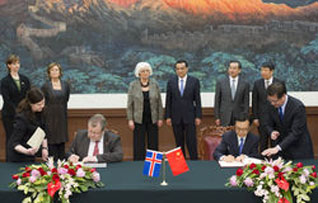 ween China and Iceland will impact seafood prices for Northern European suppliers as Chinese buyers suck up more supply. That’s according to an Icelandic official in China — the governments of China and Iceland will be eager to show that the free trade agreement (FTA) is a success, said Ragnar Baldursson, minister counselor and deputy chief of mission at the embassy of Iceland in Beijing.
ween China and Iceland will impact seafood prices for Northern European suppliers as Chinese buyers suck up more supply. That’s according to an Icelandic official in China — the governments of China and Iceland will be eager to show that the free trade agreement (FTA) is a success, said Ragnar Baldursson, minister counselor and deputy chief of mission at the embassy of Iceland in Beijing.Set to come into affect in July, the FTA is China’s first with a European country and could boost Iceland’s EUR 50 million (2012 figure) exports to China, made up mostly of fishery products. Baldursson is predicting a surge in seafood exports (both in official figures and the so-called grey trade via Hong Kong and Vietnam) from Iceland to China this year. He believes rising Chinese demand for seafood will be matched by a willingness to pay a premium on other major seafood importing nations such as Japan.
“The seafood trade is very sensitive to price: if there’s a shift of two or three percent it will show in the trade figures. New customers will pay a little more. You may have a tendency to stay with the old customers when there’s only one or two percent in the price but if that shifts to 5 percent [more offered by new customer] you will shift to a new customer.”
The China-Iceland FTA will ultimately benefit other regional players, including Norway — which has in recent years struggled to get its products through Chinese ports — according to Baldursson. “A shortage of Icelandic seafood supply [caused by increased shipments to China] will be filled by Norway and lead to an increase in Norwegian prices.” He believes China will ultimately sign a free trade agreement with Norway, as part of its strategy to increase influence and access among North Atlantic states, particularly those not in the EU. Negotiations between Beijing and Oslo on an FTA have stalled since the award of a Nobel peace prize in 2011 to a Chinese dissident — even though the award was not endorse by Norway’s government.
Beijing’s desire to tap the North Atlantic may soften its approach to Norway. “China is very aware it can’t access these [North Atlantic] fishing resources but it would very much like to.” China’s free trade deals with northern European states like Iceland and Norway should be seen as part of China’s strategic moves to meet its priority strategic needs — food and energy — believes Baldursson.
Courtship of Northern European states may also be part of China’s growing interest in the Arctic region. Iceland’s prime minister was the first to be received by China’s premier Li Keqiang on taking office last year. This honor for a tiny island state and the subsequent signing of an FTA both came before China’s entry as a permanent observer member of the Arctic Council, an intergovernmental body of states seeking to set rules on Arctic governance.
Competition for fisheries resources looks set to increase in the context of global competition for Arctic access. Iceland is possibly positioning itself as a gateway to the Arctic region for booming Asian economies like China, according to Dr. Marc Lanteigne, a researcher on China’s Arctic policy based at Victoria University of Wellington in New Zealand. He explains how China is interested access to Greenland’s deposits of rare earths, uranium and oil as the two kilometer thick ice sheet starts to melt. Likewise, China is adding another icebreaker to enable quicker cargo passage to Europe via the Arctic. “China is also very interested in the potential to save time and money by shipping right across the Arctic…the journey time from Dalian to Rotterdam is doable in 33 days which is two weeks shorter than the conventional route via the Indian Ocean,” said Lanteigne.





